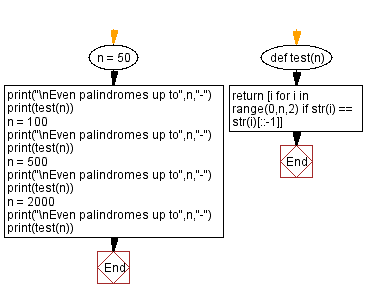Python: Find all even palindromes up to n
Find Even Palindromes
From Wikipedia,
A palindromic number (also known as a numeral palindrome or a numeric palindrome) is a number (such as 16461) that remains the same when its digits are reversed. In other words, it has reflectional symmetry across a vertical axis. The term palindromic is derived from palindrome, which refers to a word (such as rotor or racecar) whose spelling is unchanged when its letters are reversed. The first 30 palindromic numbers (in decimal) are: 0, 1, 2, 3, 4, 5, 6, 7, 8, 9, 11, 22, 33, 44, 55, 66, 77, 88, 99, 101, 111, 121, 131, 141, 151, 161, 171, 181, 191, 202, ...
Write a Python program to find all even palindromes up to n.
Output: Even palindromes up to 50 - [0, 2, 4, 6, 8, 22, 44] Even palindromes up to 100 - [0, 2, 4, 6, 8, 22, 44, 66, 88] Even palindromes up to 500 - [0, 2, 4, 6, 8, 22, 44, 66, 88, 202, 212, 222, 232, 242, 252, 262, 272, 282, 292, 404, 414, 424, 434, 444, 454, 464, 474, 484, 494] Even palindromes up to 2000 - [0, 2, 4, 6, 8, 22, 44, 66, 88, 202, 212, 222, 232, 242, 252, 262, 272, 282, 292, 404, 414, 424, 434, 444, 454, 464, 474, 484, 494, 606, 616, 626, 636, 646, 656, 666, 676, 686, 696, 808, 818, 828, 838, 848, 858, 868, 878, 888, 898]
Sample Solution:
Python Code:
# Define a function named 'test' that takes a positive integer 'n' as input
def test(n):
# List comprehension to find even palindromic numbers up to 'n'
return [i for i in range(0, n, 2) if str(i) == str(i)[::-1]]
# Assign a specific value to the variable 'n'
n = 50
# Print a message indicating the range of even palindromes to be found
print("\nEven palindromes up to", n, "-")
# Print the result of the test function applied to 'n'
print(test(n))
# Assign another specific value to the variable 'n'
n = 100
# Print a message indicating the range of even palindromes to be found
print("\nEven palindromes up to", n, "-")
# Print the result of the test function applied to 'n'
print(test(n))
# Assign another specific value to the variable 'n'
n = 500
# Print a message indicating the range of even palindromes to be found
print("\nEven palindromes up to", n, "-")
# Print the result of the test function applied to 'n'
print(test(n))
# Assign another specific value to the variable 'n'
n = 2000
# Print a message indicating the range of even palindromes to be found
print("\nEven palindromes up to", n, "-")
# Print the result of the test function applied to 'n'
print(test(n))
Sample Output:
Even palindromes up to 50 - [0, 2, 4, 6, 8, 22, 44] Even palindromes up to 100 - [0, 2, 4, 6, 8, 22, 44, 66, 88] Even palindromes up to 500 - [0, 2, 4, 6, 8, 22, 44, 66, 88, 202, 212, 222, 232, 242, 252, 262, 272, 282, 292, 404, 414, 424, 434, 444, 454, 464, 474, 484, 494] Even palindromes up to 2000 - [0, 2, 4, 6, 8, 22, 44, 66, 88, 202, 212, 222, 232, 242, 252, 262, 272, 282, 292, 404, 414, 424, 434, 444, 454, 464, 474, 484, 494, 606, 616, 626, 636, 646, 656, 666, 676, 686, 696, 808, 818, 828, 838, 848, 858, 868, 878, 888, 898]
Flowchart:

For more Practice: Solve these Related Problems:
- Write a Python program to generate all even palindromic numbers up to a given limit using string reversal.
- Write a Python program to filter numbers up to n that are palindromic and even, and return them in a sorted list.
- Write a Python program to check each number from 0 to n and include it in the output list if it is both even and a palindrome.
- Write a Python program to use list comprehension to collect even numbers that are palindromic when converted to strings.
Go to:
Previous: Determine which characters of a hexadecimal number correspond to prime numbers.
Next: Find the minimum even value and its index from a given array of numbers.
Python Code Editor :
Have another way to solve this solution? Contribute your code (and comments) through Disqus.
What is the difficulty level of this exercise?
Test your Programming skills with w3resource's quiz.
